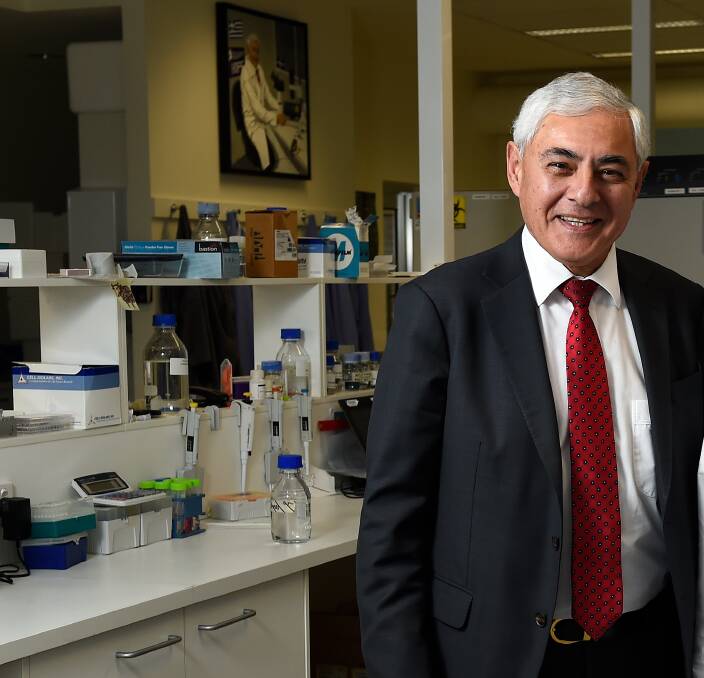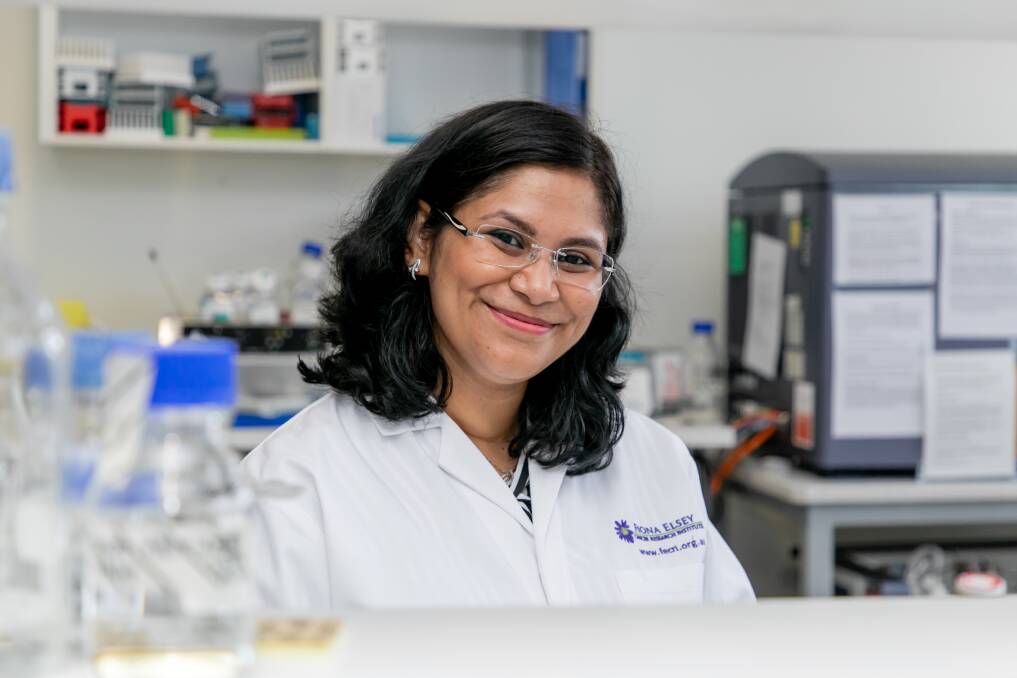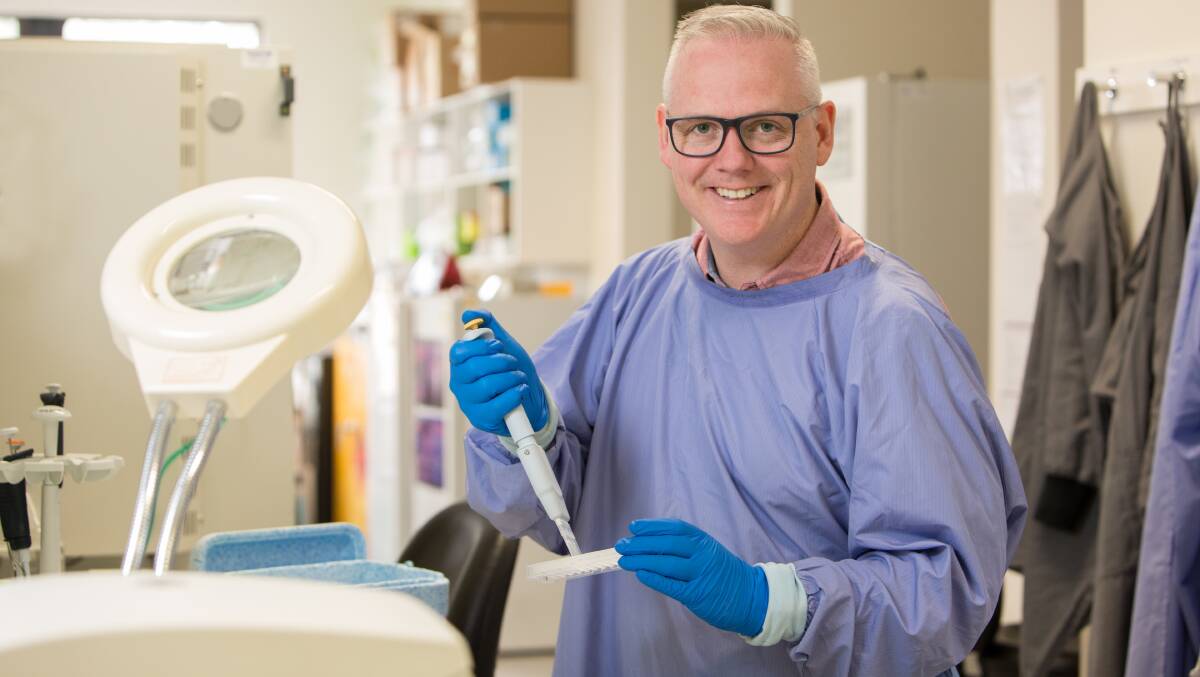
Vital hunt for 'silver lining' on dark clouds
LIFE-changing work and the hunt for answers at Fiona Elsey Cancer Research Institute will not yield to the cornovirus strain on the health system and everyday life.
Subscribe now for unlimited access.
or signup to continue reading
In-roads researchers are making on the immune system and its response to fight cancer and auto-immune conditions might help pave the way to a COVID-19 vaccine. But this might not.
What FECRI honourary director George Kannourakis, also an oncologist, does know is cancer is not suspending its action amid the pandemic.
The Ballarat Institute, the only regional cancer institute in Australia, must be prepared to assist in the fight to tackle coronavirus if needed. Professor Kannourakis said the best way his team can be ready is to keep doing what they do best - their job.
Should there be a complete community lockdown, FECRI will continue to provide its vital services and testing for patients undergoing clinical trials to ensure they can access the trial drugs they need. FECRI can also continue to collect samples from biopsies, operations and pathology - scientists always treated specimens as infectious. Both programs, Professor Kannourakis said, were generally not not as well known about FECRI.
Th lab, in Ballarat's central technology park, offers a secure environment for researchers to keep working - no longer in groups, but in isolation.
One of the most important things we can do is research because cancer is not an elective disease. People still need treatment, they still need biopsies.
- George Kannourakis, FECRI honourary director
"It's important this work goes ahead. No doubt we have the capacity to help out with our research and we have to, if ever the government calls on us," Professor Kannourakis said. "We're doing a lot on immunology, and that's topical at the moment.
"...One of the most important things we can do is research because cancer is not an elective disease. People still need treatment, they still need biopsies.
"Everyday life continues and the need to find answers continues, so we look for hope and future development. Just as research for infection and immunity still goes on at places like the (Peter) Doherty Institute, we research to play out part on cancer and other auto-immune diseases."
Click on the photo below to read more about researcher Jason Kelly and his team's work on 'rogue' cells promoting bowel cancer
FECRI officially launched its highly-touted breast cancer program on Friday. This program was driven by Ballarat community support with more than $300,000 raised in last month's Ballarat Cycle Classic.
The effort, topping a philanthropic seed donation, has secured a full-fledged research program led by decorated senior researcher Aparna Jayachandram to focus on tackling the most aggressive breast cancers.
Professor Kannourakis said, as with all FECRI work, research tends to overlap with commonalities in proteins blocking immune responses. This can suggest pathways for other researchers to follow.
The Institute will still collaborate with research partners worldwide during the pandemic.
All PhD candidates can still access what they need for their research.
Researchers who can work from home, mostly in writing up papers, is doing so.
Teamwork and presentations will be done online, like many organisations still in operation.
Professor Kannourakis said his team ad a duty of care to patients in need and to the community to keep working.
He also said there was a lot more all Australians could do, taking this pandemic seriously and protecting others for essential services because life does go on.
My old saying is 'behind every dark cloud there is a silver lining'. We just need to find those silver linings.
- Professor George Kannourakis, FECRI honourary director
"We have to think innovatively how to be more effective in this time until we get over this crisis," Professor Kannourakis said.
"This time might be a nudge to other people to think 'how can I be more innovative' and 'how can I offer hope to create change'.
"My old saying is 'behind every dark cloud there is a silver lining'. We just need to find those silver linings."
Region's patients have key role in unlocking triple-negative
PATIENTS across western Victoria will be key to ground-breaking work in unlocking the most aggressive breast tumours at Ballarat's Fiona Elsey Cancer Research Institute.
Access to biopsies and blood samples will be vital to FECRI's new community-funded breast cancer program, which officially launched on Friday.
FECRI honourary director George Kannourakis is meeting with the region's breast cancer surgeons for how Ballarat can play a strong role in tackling triple-negative breast cancer. This will continue on from the $300,000 fundraising effort from Ballarat Cycle Classic last month, on top of philanthropic seed funding, to get a fully-fledged program off the ground.
Professor Kannourakis said the next step would be patient consent from those needing a biopsy for a suspicious lump.
Researchers will study the immune cells and cancer cells of all breast cancer patients. This will allow a comparison and chance to explore why triple-negative breast cancer does not respond as well to chemotherapy treatment.
"A cocktail of antibodies" is where Professor Kannourakis can see cancer treatment headed.
The Institute's programs, including chronic lymphocytic leukaemia and ovarian cancer, work on a similar approach to identify proteins in cancer cells that create a fog and block the body's immune cells from doing their job.
Each individual's cancer presents a different "barcode" of proteins in various amounts, Professor Kannourakis said. Determine the barcode, and researchers could test for antibodies to combat this.

FECRI has recruited internationally-recognised senior researcher Aparna Jayachandran to lead the breast cancer program.
Dr Jayachandran arrives with a wealth of experience in cell biology, molecular biology and immune study. Her most recent appointment was leading a liver cancer research team for Gallipoli Medical Research Institute at University of Queensland.
She has also held appointments at Germany's Liebig University, Germany and New York's Mount Sinai School of Medicine, University of Melbourne, Latrobe University, and Olivia Newton John Cancer Research Institute.
Dr Jayachandran moved to Ballarat with her husband and one-year-old child for FECRI, having workde in collaboration with Ballarat researchers and oncologists in her work.
To hear how the community is very supportive is important to me.
- Dr Aparna Jayachandran
"To hear how the community is very supportive is important to me," Dr Jayachandran said. "I've worked on different tumour streams but will be focusing on triple-negative breast cancer because we don't have better treatment options - this needs more research."
Triple-negative tumours account for about 15 per cent of breast cancers, has worse outcomes and usually is found in younger women.
Breast cancer is the second most common cause of cancer-related deaths in Australian women.
Have you signed up to The Courier's variety of news emails? You can register below and make sure you are up to date with everything that's happening in Ballarat.















